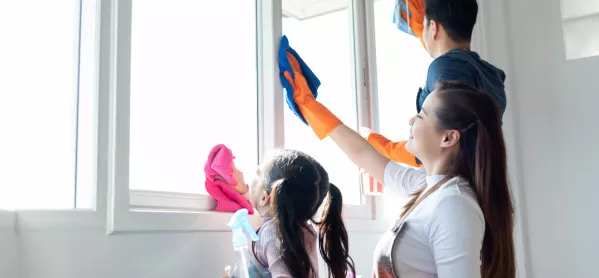Why we get our students to clean the school
Share
Why we get our students to clean the school
Students sitting and eating together is a familiar scene around the world.
However, in Japan, there is a tradition that occurs after the last bentos have been put away that is perhaps not so familiar.
As soon as the bell rings indicating that lunch is over, there is a buzz of activity as students begin reporting to various locations around the school.
A group of eleventh-grade boys don aprons, rubber gloves, and scrub brushes. They are on latrine duty. Across the way, another group are preparing to sweep leaves and a third party is off to clean the doors.
Because in Japan all students are responsible for keeping the school clean.
Students cleaning the school
They don’t do the same job all the time, though. Instead, they are assigned to a rotating duty station.
So the boys cleaning the bathrooms at the moment will clean the hallways next month, and maybe they’ll be assigned to water the plants and flowers after that.
Regardless of assignment, everyone has a job to do, and there is always work to be done.
From scrubbing out the door jamb to making the track smoother, to feeding worms to our resident pet axolotl (a type of amphibian) Michael with chopsticks, everyone has a set of responsibilities that they must attend to.
Younger students can often be seen making a game of it, racing their friends to see who can scrub the floor quickest.
A good sense of camaraderie develops quickly, too.
I once witnessed five students gathered around a corner, watching one particularly brave student armed with a cloth attached to the end of a stick battling back stubborn cobwebs.
When I asked one of the observers what exactly they were doing, they simply laughed and replied “moral support!”
Teachers pitch in, too
Teachers get involved too.
My job for the past two years has been to sweep up fallen leaves at the very front of the school. I am generally assigned four or five students to help with the task.
I don’t speak Japanese very well, and some of my helpers are still working on their English, so through a series of grunts and pantomimes, we divide up the task at hand into quadrants.
If it has been a particularly windy day and there are leaves everywhere, we might commandeer a few extra students who are nearby.
We use traditional bamboo brooms, which look as if they came out a history book and have real twigs attached to the ends of them.
It can take a while but we get the job done.
And besides, efficiency is hardly the point. It’s about something far deeper.
Shared responsibility
Cleaning the school is a form of shared responsibility.
Students see from a very young age that any potential messes or clutter they make will have to be cleaned up by somebody they know, not some nameless, faceless person who does it later.
In this way, they can begin to realise that their actions do have consequences and that they are not just individuals who can do what they like. They are part of a larger group.
Group cohesion
Any group activity that involves everyone can create group cohesion. I think this is why everyone has a role (however minor) in cleaning the school.
Think about the message it sends when your boss rolls up their sleeves and does the work beside you. It’s like that but for the whole school, teachers included.
This again drives home the point that no task is too menial or beneath us. When you see teachers and students side by side, on their knees cleaning shoeboxes, this becomes clear rather quickly.
Does it work?
Especially given the concerns around Covid-19, folks reading this might wonder how clean the school actually gets if students are doing the majority of the cleaning.
While I will admit that teachers have had to step up in the past few months (particularly in terms of wiping surfaces with disinfectant), you’d be surprised at how well this works at actually cleaning, and at building a common culture.
Could it work at my school?
This question is a bit trickier. One of the many unique aspects of Japan is its collectivist culture. This was something I had trouble with adjusting to as a very individualist American.
Perhaps instead of trying to recreate the culture exactly, it would be better to take the ideas of group cohesion and shared responsibility and look for ways to include them in your own setting and environment.
There are downsides, like anything else, to having students clean their school. It takes up time every day, and I’m not sure it would work in different cultural contexts.
But it works here, and there are lessons to be learned from it.
Now, if you’ll excuse me, we have some tidying up to do.
George Evans is an international middle and high school English teacher living and working in Japan. He has worked in America, Thailand, Korea, and Japan
